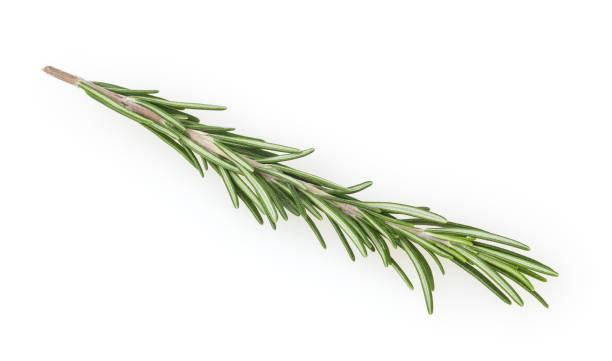
Uses of Rosemary
Recently, I found myself in a crowded matatu, navigating through the vibrant chaos of the city. I couldn’t help but notice the enchanting scent that wafted from a fellow passenger. Curious, I leaned over to ask about the fragrance, hoping to glean a whiff of their expensive perfume.
To my surprise, they smiled and shared that it was their self-made rosemary hair shampoo. Intrigued, I realized this humble herb, known scientifically as Salvia rosmarinus, holds far more than culinary uses.
In this blog, we will explore the many interesting uses of rosemary, its medicinal value, and its rising popularity in Today.

Understanding Rosemary: Scientific Names and Physical Attributes
The rosemary plant, Salvia rosmarinus, is a fragrant evergreen herb belonging to the mint family, Lamiaceae. It typically grows between 2 to 4 feet tall, showcasing needle-like leaves that are deep green on top and silvery underneath. The plant blooms with small, pale blue flowers that add a splash of color to any garden.
Rosemary thrives in well-drained soil and enjoys full sunlight, making it an excellent candidate for gardens or pots. Beyond its aesthetic appeal, it is renowned for its strong aroma, which is attributed to its rich essential oil content, particularly rosmarinus acid, which gives it that distinctive scent and flavor.
Proven Medicinal Value of Rosemary
Rosemary has a long history in herbal medicine, with proven benefits that extend beyond the kitchen. The health benefits of Salvia rosmarinus are well-documented. Here are some of the most notable medicinal properties:
- Cognitive Boost: It is believed to improve memory and concentration. Studies suggest that the scent of rosemary can enhance alertness and cognitive performance. Simply inhaling its oil may help keep your mind sharp.
- Anti-Inflammatory Properties: The health benefits of rosemary extend to its ability to reduce inflammation. Its compounds, such as rosmarinic acid, are known to help alleviate symptoms associated with arthritis and other inflammatory conditions.
- Digestive Aid: It has traditionally been used to alleviate digestive issues. It can help reduce bloating and discomfort, making it a valuable addition to meals or teas.
- Antioxidant Effects: It contains powerful antioxidants that combat oxidative stress. This property helps protect the body from damage caused by free radicals.
- Antimicrobial Benefits: Studies show that rosemary oil can inhibit the growth of certain bacteria and fungi, making it a natural preservative in foods and cosmetics.
Popular Uses – From Culinary to Cosmetic
When it comes to the uses of rosemary, people often start with the best-known applications:
1. Culinary Herb
Rosemary is a staple in many kitchens worldwide. Its robust flavor pairs well with roasted meats, vegetables, and even bread. Chefs often use its leaves in marinades, sauces, and dressings. Adding it to dishes enhances their flavor profile and adds a unique aromatic touch.
2. Essential Oil
Rosemary oil is widely popular for its numerous applications. It serves as an effective aromatherapy agent, promoting relaxation and reducing stress. Many people use its oil for hair growth, believing it stimulates follicles and encourages healthy hair.
3. Hair Care Products
As my matatu experience highlighted, the herb is making waves in hair care. Rosemary water for hair has gained attention for its potential benefits in promoting hair growth and reducing dandruff. Incorporating rosemary into shampoos and conditioners enhances their effectiveness and adds a pleasant fragrance.
4. Natural Preservative
Rosemary has natural antimicrobial properties, making it an excellent addition to food preservation. Many food manufacturers are exploring its extracts as natural preservatives to enhance shelf life without artificial additives.
5. Flavoring Agent in Beverages
In 2024, we’re seeing a trend in using rosemary as a flavoring agent in beverages. You might find rosemary-infused cocktails or herbal teas that offer a refreshing twist.
6. Skin Care
The benefits of the herb extend to skincare as well. Its antimicrobial properties make it a valuable ingredient in creams and lotions. Many skincare products incorporate rosemary oil for its soothing and rejuvenating effects.
7. Garden Companion
Beyond culinary and medicinal uses, rosemary also serves as a companion plant in gardens. It repels certain pests and attracts pollinators, making it beneficial for growing alongside other herbs and vegetables.
8. Flavor Innovation
Looking towards the future, we can expect exciting innovations like rosemary being added to yogurt and ice cream flavors. Its unique flavor profile can offer an unexpected twist in desserts, appealing to adventurous eaters.
Starting a Small Garden with Rosemary: 3 Benefits
Starting a small garden with Salvia rosmarinus can offer numerous benefits. Here are three compelling reasons to consider:
1. Fresh Ingredients at Your Fingertips
Having a rosemary plant at home ensures you always have fresh ingredients for cooking and herbal remedies. This accessibility allows you to enhance your meals and improve your health without frequent trips to the store.
2. Cost-Effective
Growing them at home can save you money in the long run. Instead of purchasing fresh herbs, you can harvest your own. Salvia rosmarinus is a hardy plant that requires minimal maintenance, making it an ideal choice for beginners.
3. Therapeutic Gardening
Gardening itself is a therapeutic activity. Tending to your rosemary plants provides an opportunity to connect with nature, reduce stress, and enjoy the satisfaction of growing your own herbs.
Current Demand
In 2024, the demand for this herb is on the rise. As more people recognize its culinary and medicinal benefits, the market for rosemary products expands. From essential oils to hair care solutions, consumers are increasingly turning to natural ingredients. This trend is particularly evident in the wellness and beauty industries, where the herb is embraced for its holistic properties.

Possible Future Value
Looking ahead, rosemary’s potential seems limitless. As culinary trends shift toward natural and unique flavors, we may see it finding its way into unexpected products. Imagine rosemary-infused yogurt and ice cream that not only taste great but also offer health benefits. The versatility of this herb ensures that its popularity will continue to grow, paving the way for new market opportunities.
Celebrating the Versatility of Rosemary
In summary, rosemary is an incredibly versatile herb with a rich history and a promising future. Its many uses—from culinary to cosmetic make it a staple in many households. Whether you’re interested in its health benefits, culinary applications, or gardening potential, the herb holds something for everyone.
As you consider adding it to your life, remember this fun fact: Rosemary has been associated with memory and remembrance throughout history. In ancient Greece, students wore rosemary garlands during exams, believing it would enhance their memory!






